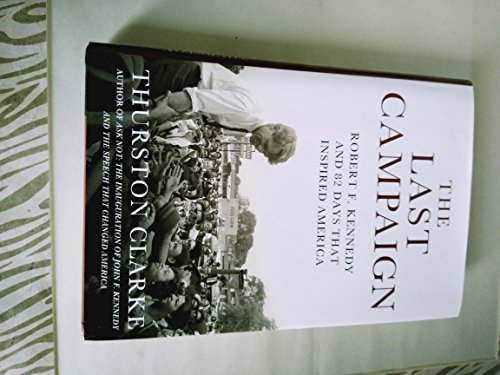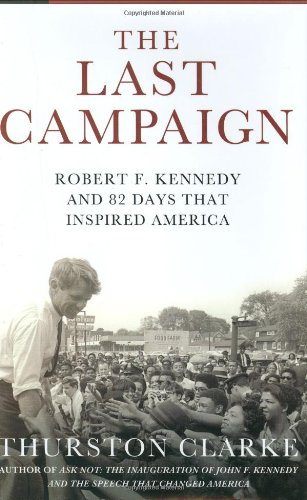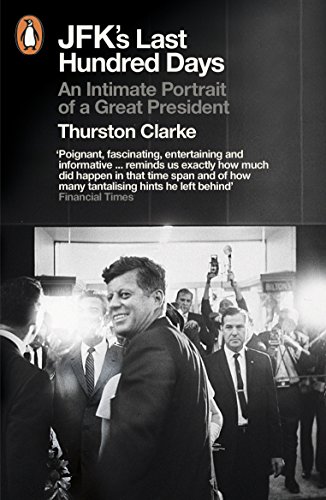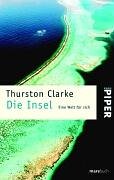
The Last Campaign: Robert F. Kennedy and 82 Days That Inspired America
von Clarke, Thurston
20,97 €
Einband: Gebundene Ausgabe
Seitenzahl: 321 Seiten
Erscheinungsdatum: 01.01.1970
gefunden bei Amazon Marketplace
Zum Shop
Beschreibung
Used Book in Good Condition brand: Brand: Henry Holt and Co. manufacturer: Henry Holt & Co
The Last Campaign: Robert F. Kennedy and 82 Days That Inspired America von Clarke, Thurston im Online-Buchhandel:

The Last Campaign: Robert F. Kennedy and 82 Days That Inspired America
von Thurston Clarke
119,81 €
gefunden bei AMZN_MP
Amazon Best of the Month, June 2008: When Senator Robert F. Kennedy entered the presidential race during...
Amazon Best of the Month, June 2008: When Senator Robert F. Kennedy entered the presidential race during the chaotic year of 1968, anarchy appeared to be gathering on the horizon. America was coming to grips with an unwinnable war in Vietnam and unacceptable social policies at home. The Last Campaign examines Kennedy's bold (and tragically shortened) efforts to awaken his country's social conscience and moral sensibility. In contrast to the cocksure attitude of Thirteen Days (RFK's own 1962 memoir of the Cuban Missile Crisis), Thurston Clarke reveals a very human politician who often trembled at the podium and scanned crowds for an assassin's glare. Though motivated to serve by an unwavering desire to help the poor and oppressed, Kennedy also lived with a deep fear that his life would be cut short by violence. "I'm afraid there are guns between me and the White House," he prophetically remarked during the spring of '68. Yet The Last Campaign chooses not to explore what could have been. Instead, Clarke focuses on what is certain: for an 82-day period, Kennedy "convinced millions of Americans that he was a good man, perhaps a great man." --Dave Callanan Exclusive Q&A with Author Thurston Clarke Kennedy during a 1967 visit to the Mississippi Delta where he found children starving in windowless shacks. Attorney General Robert F. Kennedy and his brother, President John F. Kennedy, conferring at the White House. Kennedy discussing the assassination of Martin Luther King Jr. with press secretary Frank Mankiewicz on April 4, 1968. Amazon.com: He was a Presidential candidate for less than 100 days - why does the name Bobby Kennedy continue to resonate today? Clarke: The fact that he was the brother of a beloved and martyred president, and that he was also assassinated are of course important factors. But I think Bobby Kennedy continues to be relevant because he tackled issues such as race, poverty, and an ill-advised and unpopular war that remain relevant. And not only did he address these issues but he addressed them with an honesty and passion that no other president or politician has equaled since 1968. Amazon.com: Despite his own fears, Kennedy made himself dangerously accessible to crowds. Was this an act of defiance or conviction? Clarke: It was both defiance and conviction. Speaking of President Johnson’s bubble-topped, bulletproof limousine, he told a reporter, "I’ll tell you one thing: if I’m elected President, you won’t find me riding around in any of those God-damned cars. We can’t have that kind of country, where the President is afraid to go among the people." When his aides (who were worried about his safety throughout the campaign) urged him to spend more time campaigning from television studios and less time plunging into crowds, he told them, "There are so many people who hate me that I’ve got to let the people who love me see me." Kennedy also knew that crowds revived him–"like a couple of drinks," according to aide Fred Dutton–and that letting people see him in person was the best way to prove that his reputation for being "ruthless" was unmerited. Amazon.com: Hypothetical questions achingly surround Bobby Kennedy and his legacy. Did any single "What if?" occupy your thoughts as you researched this book? Kennedy campaigning in Los Angeles during 1968 Clarke: Several "What ifs" haunted me. Kennedy had wanted to avoid going to the Ambassador Hotel on the evening of June 4, 1968 and instead watch the returns at the home of John Frankenheimer. The networks, however, protested that they needed him at the hotel for interviews and wanted to cover the victory celebration live if he won. Kennedy caved in and went to the hotel. Kennedy always went through the crowd in a ballroom or auditorium after speaking, and became angry with aides who tried to hustle him out a back door. But on the night of his assassination, he broke his own rule and went through the hotel pantry where Sirhan Sirhan was waiting. And what if he had won the nomination and become president? I doubt that there would have been riots at the Democratic convention in Chicago that year -- riots that helped elect Richard Nixon to the presidency and that have proven to be an albatross around the neck of Democrats for forty years. A President Robert Kennedy would have withdrawn America from Vietnam soon and there would be fewer names on the Vietnam wall. There would have been no bombing of Cambodia, Kent State, or Watergate, and so on, and so on. Amazon.com: Kennedy's campaign strategy was fraught with risk, as one observer remarked that "he kept hammering away at the plight of the poor when there was more chance for political loss than gain." Had Bobby simply had enough with politics as usual? Clarke: Kennedy’s obsession with the plight of America’s poor was more the result of his own personal experiences than any rejection of politics as usual. He had held a starving child in his arms in Mississippi. He had visited the appalling schools on Indian reservations where students learned nothing about their own culture and history. He had tramped through tenements in Brooklyn and come upon a girl whose face had been disfigured by rat bites. He believed that he had a responsibility to educate the American people about these conditions. During a flight on his chartered campaign plane he told Sylvia Wright of Life magazine, ". . . for every two or three days that you waste time making speeches at rallies full of noise and balloons, there’s usually a chance every two or three days . . . where you get a chance to teach people something; and to tell them something that they don’t know because they don’t have the chance to get around like I do, to take them some place vicariously that they haven’t been, to show them a ghetto, or an Indian reservation." And it was moments like these, Kennedy told Wright, that made a political campaign, despite all its banalities and indignities, "worth it." Amazon.com: In your opinion, will we ever see another Bobby Kennedy? Have we become too jaded to embrace a candidate like RFK or has campaigning simply become political theater? Clarke: One of the aides who scheduled many of Kennedy’s appearances that spring, told me, "What he did was not really that mystical. All it requires is someone who knows himself, and has some courage."
Verlag: Henry Holt
Zur Online-Buchhandlung von
AMZN_MP
AMZN_MP
Bewerte das Buch
- Habe ich gelesen
- Möchte ich noch lesen
- Lieblingsbücher
- Wunschliste
Weitere Bücher von Clarke, Thurston

JFK's Last Hundred Days: An Intimate Portrait of a Great President
von Clarke, Thurston
gefunden bei Amazon Marketplace
ab 12,50 €

JFK's Last Hundred Days: An Intimate Portrait of a Great President
von Clarke, Thurston
gefunden bei Amazon
ab 21,15 €
